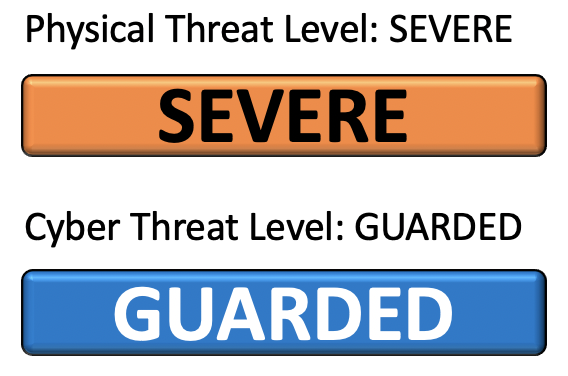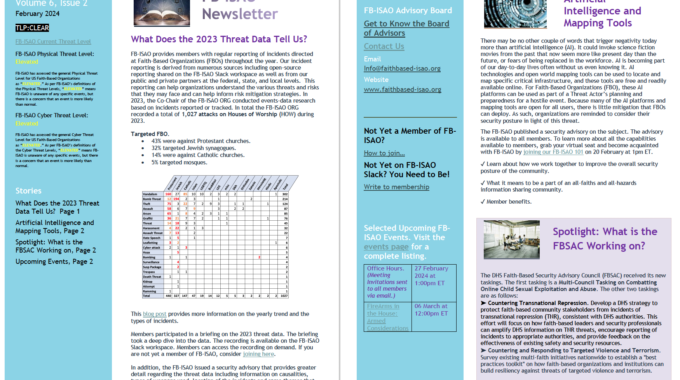FB-ISAO provides members with regular reporting of incidents directed at Faith-Based Organizations (FBOs) throughout the…

August 2020: FB-ISAO Physical Threat Level Remains SEVERE; Cyber Threat Level Remains GUARDED
This message is TLP:WHITE. Subject to standard copyright rules, TLP:WHITE information may be distributed without restriction.
The COVID-19 global pandemic is a complex and blended threat impacting members and the broader faith-based and charity community in numerous ways. FB-ISAO’s Threat and Incident Response Group (TIG) continues to assess the ongoing threats and risks to our community and has made the following updates to our Threat Level Assessments:

The TIG has determined to maintain the Physical Threat Level at “SEVERE.” SEVERE means an event is highly likely. The TIG will continue to assess the Physical Threat Level and provide updates accordingly. This determination is valid through sunset on 31 Aug 2020, and will be periodically re-evaluated, especially with respect to ongoing threats and developing federal, state, local, tribal, and territorial (FSLTT / SLTT) guidance and directives.
The TIG has determined to maintain the Cyber Threat Level at “GUARDED.” GUARDED means FB-ISAO is unaware of any specific or targeted cyber attacks, but a general risk of cyber attacks exist. The TIG will continue to assess the Cyber Threat Level and provide updates accordingly. Likewise, the cyber threat landscape will be continuously monitored, but this Cyber Threat Level determination is valid until further notice.
- Please refer to this post for an explainer on the FB-ISAO Threat Levels.
- Please see this 15 May post regarding the distribution of the FB-ISAO Pandemic Reopening Reentry Checklist.
- Please see this important Message to the Community of Faith, from the DHS Assistant Director of Infrastructure Security (08 Apr 2020)
Reopening America. Across the country, many FBOs have reopened or are preparing to reopen, while others have elected to continue to suspend in-person activities (some determining to do that through at least the rest of 2020). As we continue in the process of reopening, with the possibility of having to move back to more stringent restrictions or delays in continued reopening based on events in our local communities, FB-ISAO continues to strongly encourage members “hold the line.” By hold the line, we mean continue to follow FSLTT guidance and directives and reopen, reenter and resume operations in accordance with, and not ahead of, such guidance and directives.
Several states and local communities are continuing experience new highs, though some of “hotspots” seem to be leveling off, in identified infections and deaths and CDC expects the death rate to steadily continue to climb, stating (as of 20 Jul) that “there will likely be between 160,000 and 175,000 total reported COVID-19 deaths by August 15th.” While personally and organizationally, many are understandably feeling pandemic fatigue, the coronavirus remains an active health threat with the potential to lead to local outbreaks or broader flare-ups, particularly if established best practices such as social distancing and mask wearing are not followed. As leaders, we encourage members to fight complacency and fatigue. FBOs should not base policies or enforcement on personal feelings, politics, or other subjective considerations. While as individuals we may agree or disagree with specific measures, FB-ISAO strongly discourages defying state and local guidance and directives and encourages members to reopen, reenter and resume operations in accordance with government guidance and directives.
Regarding the Physical Threat Level, coronavirus remains a serious threat in the United States, with various states and local communities experiencing increasing infection numbers and with several recent local outbreaks related to gatherings at FBOs, such as:
- Hundreds of kids exposed to COVID-19 at Dallas-Fort Worth church camp, parents say (Fort Worth Star-Telegram, 23 Jul)
- Pastor: 40 infected with coronavirus after church event; An Alabama pastor says more than 40 people have been infected with the coronavirus after attending a multi-day revival event at his Baptist church (ABC News, 27 Jul)
A health threat poses a challenge in assessing a threat level. In accordance with FB-ISAO’s threat levels, in many respects we are still in a “CRITICAL” phase, given that the pandemic remains very active and that further outbreaks are expected as reopening continues. The likelihood of a broad second wave of COVID-19 remains very possible, particularly if individuals, organizations and communities fail to follow identified best practices to mitigate risks.
Beyond the explicit health threat, we have other security concerns, including:
- As noted above, SEVERE means we believe an event is highly likely. With respect to our current environment and this assessment, we assess an event to be one of two types:
- Local Outbreak. The possibility of a local COVID-19 outbreak remains very possible. FBOs in particular may experience rapid spread and infection if infected individuals are exposed to larger groups.
- Hostile Events. In addition to routine threats, additional stressors may increase challenges for FBOs. That concern is raised in Assistant Director Harrell’s 08 Apr letter to the faith-based community. There are also other challenges that could lead to hostile events or provide opportunities for individuals or small groups to conduct acts of violence.
- Protests & Targeting of African-American People and Facilities. On 01 June we assessed that “protests relating to the death of George Floyd and racial issues take on a political dimension, it is also possible extremists could choose to target predominantly African American places of worship.” Sadly, that has come to fruition. Threats and hostile events have occurred at FBOs, to include predominantly African-American churches such as in Virginia and Kentucky. As Black Lives Matters and associated protests continue, this remains a concern.
- Protests & Targeting Other People of Faith. As domestic protests demand law enforcement resources, some extremists have suggested using that as an opportunity for attacks against people of faith – and synagogues specifically. We have seen this occur internationally and remain concerned about the possibility of domestic incidents.
- Disgruntled Individuals. Individuals who do not agree with positions taken by an FBO during periods of closure and reopening may take action against those organizations or others.
- Political Events. Presidential elections, particularly during times of adversity, such as with the pandemic and associated economic impacts, or relating to other emotional topics, such as the removal of statues and monuments, can lead to a highly-charged atmosphere and pose associated risks to FBOs in the area which may not be directly targeted by indirectly implicated. As election-related activities increase in the months ahead, it is possible rallies may see protests and counter-protests – aimed at politicians, groups, or places of worship where events may be held. Such concerns are not limited to any party or individual but are a possibility for any political event occurring at or near an FBO.
- There continue to be varied incidents, attacks, and threats against retail establishments and personnel relating to enforcement of safety protocols such as required wearing of masks and maintaining adequate social distancing, or the wearing of masks that incite responses from others (such as KKK or Nazi masks). This has continued in recent weeks, though FB-ISAO is unaware of any known incidents that have occurred at FBOs. As FBOs reopen and welcome back individuals, it is possible that some may have heightened sensitivities regarding these issues and may not respond well to personnel attempting to enforce safety actions. FBOs should prepare “frontline” staff and volunteers regarding how to engage personnel, when to ask for help from senior personnel, and other considerations to prepare them to effectively communicate and assist visitors.
- As we continue to reopen and reenter FBOs, recognize the potential for violence based on the stressors of COVID-19, the threats from violent extremists, and the longstanding issues that have resulted in previous acts of violence at houses of worship.
- There continues to be extremist interest in conducting various attacks and hostile actions against people and places of faith (to include specific anti-Semitic rhetoric relating to exploiting COVID-19 and other extremist discussion and interest in places of worship and people of faith [see previous FB-ISAO and government partner reporting]).
- Beyond the immediate challenges, while we have yet to emerge from the “first wave,” there is a very real possibility of second and third waves until a vaccine is developed and applied nationwide. Further, many countries around the world continue on an upward trajectory and it is expected that the number of cases in many areas will continue to increase in the coming weeks.
Regarding the Cyber Threat Level, FB-ISAO assess the current volume of coronavirus-related cyber attack campaigns continues to recede and is consistent with a general “GUARDED” posture. While there is still no shortage of coronavirus-themed cyber attack campaigns, non-coronavirus lures also continue to populate the cyber threat landscape. While we assess remaining at “GUARDED” is still reasonable at this time, increased vigilance is recommended due to the ongoing pandemic, continued widespread teleworking, abundance of information and updates from legitimate and less-established sources (including social media and unofficial expert blogs), and commensurate distractions in businesses and homes across the U.S., among other considerations.
Update on #BlueLeaks: The FBI office in Houston continues to investigate. There was a report earlier this month that German authorities seized the server containing the leaked data. Likewise, Netsential has provided stakeholders with a notification of measures it has implemented and plans to implement to better secure its systems. Otherwise, as previously reported the #BlueLeaks data breach incident directly affects FB-ISAO due to the compromise of Netsential’s systems that maintain our membership and content delivery portal. That fact, plus our own partnerships with the other impacted entities, and many member’s close relationships with the same impacted entities, including fusion centers and law enforcement, still represent a very real and present threat from actors who may try to leverage those trusted relationships to phish (email or phone) for more information. Additionally, as impacted entities report on their analysis of the stolen data, a commonly captured non-public data point used for verification/validation includes registrants’ supervisor’s name and contact information. Therefore, it is likely threat actors could leverage supervisor information to lend greater credibility to the guise or to use as an additional target set. We cannot stress enough the need to exercise extreme vigilance when receiving communications purporting to come from any impacted organization, particularly ones in your region.
Additional considerations for continued increased vigilance:
- Ransomware running rampant. From municipalities and education institutions to healthcare and mega-corporations, no organization is safe from ransomware. In addition to becoming a direct victim, faith-based organizations that outsource IT services to a managed service provider (MSP) can also become an indirect victim with direct impacts when the MSP is infected. Compromising MSPs to systemically infect multiple organizations has been an increasing trend over the past year. Members are encouraged to review ransomware and data breach playbooks/policies/procedures with staff and MSPs, or at least discuss necessary actions should ransomware impact your organization. This Forrester report provides some salient points about dealing with ransomware.
- Cyberactivity spurred by ongoing #BlackLivesMatter protests. While most cyber activity surrounding protests have been targeting law enforcement and local government websites, FB-ISAO emphasizes the need for continued vigilance. Website defacements and denial-of-service (DoS) attacks have been the primary attack types thus far, but cyber threat actors are also known to aggrandize headlines to proliferate malware. Likewise, as #BlueLeaks represents, hacktivists are actively seeking to compromise organizations that are likely to contain troves of law enforcement sensitive documents for the purpose of public disclosure/dissemination.
- Contact tracing scams. Scammers are pretending to be contact tracers and sending fake text messages. Keep in mind that legitimate contact tracing messages are intended to be factual and will not ask for personal information or include a link to click. Multiple federal agencies have partnered to alert the public on avoiding contract tracing scams, including the FTC and the Justice Department.
- Mis/disinformation is still a concern. Dis/misinformation continues to spread regarding coronavirus related matters and protest activity. Disinformation is spread by various entities for disruption, deceit, and even to discredit legitimate government efforts. It is imperative to think critically and continue verifying everything. FB-ISAO continues to encourage members to treat every coronavirus-themed communication or protest related subject with suspicion.
We are all targets of opportunity. Cyber tactics such as phishing, smishing (SMS phishing), vishing (voice phishing), disinformation/misinformation, and counterfeit websites leveraging coronavirus themes will continue for the foreseeable future.
- Continue enabling/encouraging remote staff to work securely. As organizations consider a prolonged, perpetual, or even permanent work from home model, it is important to deliberate on the best strategy to promote a secure remote work environment. Many organizations and people were thrust into remote working. Those who continue working remotely may require procurement and configuration of new devices, network infrastructure, and services to securely support extended offsite working. StaySafeOnline maintains its COVID-19 Security Resource Library with an up-to-date compilation of resources to enable safe telecommuting.
- Continue providing threat awareness training to staff. There are many open source examples of emails, lures, images, and indicators of compromise being shared daily in the FB-ISAO Daily Journal. Consider appropriate ways to use that information to educate and better prepare staff. FB-ISAO is happy to help develop education and cybersecurity awareness materials for dissemination.
As we periodically update these assessments, FB-ISAO’s Preparedness Group (PG) continues to support the efforts of our broader Pandemic Recovery Group with FB-ISAO staff, PG members, and other government and industry partners, and is also liaising with the venue community in collaboration with the International Association of Venue Managers. This group has developed and released the FB-ISAO Pandemic Reopening Reentry Checklist and continues in close collaboration as we assess appropriate needs for revisions and updates. Interested in helping? Contact our team to find out how!
Please contact our team with any questions, needs for information, assistance or any other concerns.
- We encourage members to review the FB-ISAO Daily Journal for general threat awareness, updates and ideas on what other organizations are doing.
- Join the #covid-19, #protest_awareness, #cybersecurity and other topical channels in FB-ISAO Slack to see more updates, reports, and conversation on threats, and to share your questions, ideas, and actions for others.
This assessment has been developed by FB-ISAO and is our general, nationwide, cyber threat assessment for the U.S. community of faith. As always, for local threat information, members are encouraged to work closely with neighborhood partners, local law enforcement, state and local fusion centers, local FBI field offices, DHS Protective Security Advisors (PSAs), Cybersecurity Advisors (CSAs), and other local experts and responders.





